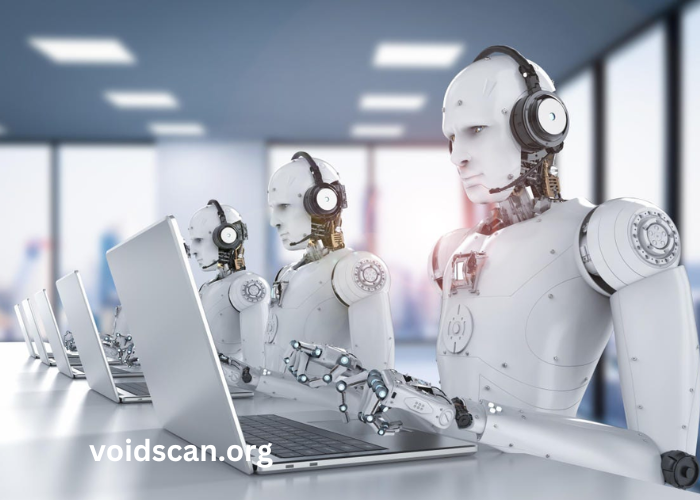
Artificial Intelligence (AI) has come a long way since its inception, evolving from theoretical concepts to powerful technologies that are reshaping industries across the globe. The future of AI holds immense promise, with the potential to revolutionize how businesses operate, enhance customer experiences, and create new opportunities for innovation. As AI continues to advance, its integration into various industries is expected to increase exponentially, offering a wide range of benefits such as increased efficiency, cost savings, and improved decision-making.
From healthcare to finance, AI is already making waves, automating processes, providing valuable insights, and streamlining operations. The growing capabilities of machine learning, natural language processing, and robotics are expected to further transform industries, bringing about changes that will influence everything from the way products are made to how customer interactions are handled. In this article, we will explore the future of AI and how it is shaping key industries, as well as the challenges and opportunities that come with this technological evolution.
1. The Evolution of Artificial Intelligence
To understand how AI is shaping industries, it’s essential to first grasp its evolution. Artificial Intelligence, once a concept relegated to science fiction, has become a reality over the last few decades. Initially, AI focused on solving specific problems through programmed algorithms and rules. Today, AI incorporates machine learning (ML), deep learning (DL), and natural language processing (NLP), making systems more adaptable and capable of learning from vast amounts of data.
AI’s journey began in the mid-20th century, but its real potential became evident in the 21st century as computing power increased, and algorithms became more sophisticated. Machine learning models, powered by neural networks, can now process vast datasets and recognize patterns with accuracy, making AI a transformative tool across various sectors. In the future, AI is expected to move beyond automation to more advanced forms of decision-making, problem-solving, and creativity.
2. AI in Healthcare: Revolutionizing Diagnosis and Treatment
One of the most significant industries benefiting from AI advancements is healthcare. AI’s ability to process and analyze vast amounts of medical data is leading to more accurate diagnoses, personalized treatments, and improved patient outcomes. Machine learning algorithms can analyze medical images, identify patterns, and assist doctors in diagnosing diseases such as cancer, heart disease, and neurological disorders.
AI is also enhancing drug discovery, helping researchers identify potential treatments more quickly and at lower costs. By simulating how different compounds interact with human cells, AI can predict the efficacy and safety of new drugs, reducing the time it takes to bring a drug to market. Furthermore, AI-powered tools like virtual assistants and chatbots are providing patients with better access to healthcare services, offering medical advice, and improving overall healthcare management.
The future of AI in healthcare holds the promise of more accurate, accessible, and affordable healthcare solutions, making it a game-changer for the industry.
3. AI in Finance: Transforming Risk Management and Customer Service
In the finance sector, AI is playing a key role in transforming how financial institutions manage risk, provide customer service, and make investment decisions. AI algorithms are capable of analyzing large datasets, identifying trends, and detecting anomalies that would be difficult for humans to spot. This allows financial institutions to make more informed decisions, mitigate risks, and improve profitability.
For example, AI-driven fraud detection systems can quickly identify unusual patterns of behavior in transactions, alerting banks to potential fraudulent activity before it causes significant damage. Similarly, AI-powered chatbots are improving customer service by providing instant support to clients, answering queries, and assisting with transactions, 24/7.
AI is also playing a critical role in algorithmic trading, where machines analyze market data and execute trades at lightning speed. By utilizing machine learning models, traders can predict market movements more accurately and optimize trading strategies. The future of AI in finance is poised to enhance data security, improve investment strategies, and provide seamless customer experiences.
4. AI in Manufacturing: Optimizing Production Processes
In manufacturing, AI is revolutionizing production processes by enhancing automation, optimizing supply chains, and improving quality control. AI-powered robots and machinery are now performing tasks that once required human labor, such as assembling products, welding, and painting. This not only increases the efficiency of production lines but also reduces the likelihood of errors and defects.
AI is also transforming predictive maintenance in manufacturing. By monitoring equipment performance and analyzing data from sensors, AI systems can predict when a machine is likely to fail, allowing companies to address issues before they lead to costly downtime. This improves the overall efficiency of manufacturing operations and extends the lifespan of equipment.
Moreover, AI-driven systems are helping manufacturers optimize their supply chains by predicting demand fluctuations and managing inventory more effectively. This leads to reduced waste, lower costs, and faster production cycles. The future of AI in manufacturing will continue to push the boundaries of automation and operational efficiency.
5. AI in Retail: Personalizing Customer Experiences
The retail industry has embraced AI to personalize customer experiences, optimize inventory management, and improve sales forecasting. AI-powered recommendation engines, such as those used by Amazon and Netflix, analyze customer preferences, past purchases, and browsing behaviors to suggest relevant products, increasing conversion rates and customer satisfaction.
AI is also being used to enhance the in-store experience through the use of smart shelves, virtual assistants, and automated checkout systems. These innovations help retailers provide a more efficient shopping experience, allowing customers to find what they need quickly and without long wait times.
Additionally, AI-driven chatbots and virtual assistants are enhancing online customer service by providing immediate assistance to shoppers. Retailers are also using AI to predict trends and manage stock levels more effectively, ensuring they have the right products available at the right time. In the future, AI in retail will continue to revolutionize how businesses interact with customers, leading to more personalized, convenient, and efficient shopping experiences.
6. AI in Transportation: Improving Efficiency and Safety
AI is transforming the transportation industry by improving traffic management, optimizing routes, and enhancing safety. Autonomous vehicles, powered by AI, are expected to revolutionize the way people and goods are transported, reducing the need for human drivers and increasing the efficiency of logistics operations.
AI-driven systems are also being used to optimize transportation routes, reducing fuel consumption, and minimizing delivery times. By analyzing real-time traffic data, AI can suggest the quickest and most efficient routes, improving overall transportation efficiency.
In terms of safety, AI-powered systems can detect potential hazards, such as pedestrians, other vehicles, and road obstacles, providing alerts and even taking corrective actions to prevent accidents. In the future, AI in transportation will play a significant role in reducing accidents, improving road safety, and creating smarter, more efficient transportation systems.
7. AI in Education: Enhancing Learning Experiences
In the education sector, AI is making learning more personalized and accessible. AI-driven platforms can analyze students’ learning patterns, identify areas where they may be struggling, and provide tailored resources to help them improve. This personalized approach to learning allows students to learn at their own pace and receive targeted support when needed.
AI is also being used to automate administrative tasks, such as grading and attendance, allowing teachers to spend more time focusing on instruction. Furthermore, AI-powered virtual tutors and chatbots are providing students with instant assistance, helping them with assignments, answering questions, and offering additional explanations.
The future of AI in education holds the potential to make learning more engaging, inclusive, and adaptive, ensuring that every student has the resources they need to succeed.
8. AI in Energy: Optimizing Resource Management
The energy industry is leveraging AI to optimize resource management, improve energy efficiency, and reduce environmental impact. AI-powered systems are being used to analyze energy consumption patterns, identify inefficiencies, and recommend ways to reduce energy waste.
In renewable energy, AI is helping to predict energy generation from sources like wind and solar, allowing for better integration into the grid. By forecasting weather patterns and analyzing historical data, AI can predict when and where energy production will be highest, ensuring that energy resources are used more efficiently.
AI is also improving energy storage systems, optimizing battery usage and ensuring that energy is stored and distributed more effectively. As the demand for sustainable energy solutions increases, AI will continue to play a vital role in making the energy industry more efficient and environmentally friendly.
9. AI in Agriculture: Enhancing Crop Yield and Sustainability
In agriculture, AI is being used to optimize farming practices, increase crop yields, and promote sustainability. AI-powered systems can monitor soil health, track weather patterns, and detect early signs of disease or pest infestations, enabling farmers to take proactive measures.
Robots and drones, powered by AI, are also being used for tasks such as planting seeds, spraying crops with pesticides, and harvesting produce. This reduces the need for manual labor and increases efficiency, allowing farmers to focus on more strategic tasks.
AI is also helping to optimize irrigation systems, ensuring that crops receive the right amount of water at the right time, reducing water waste and improving crop quality. In the future, AI in agriculture will continue to drive innovation, helping farmers to grow more food with fewer resources while minimizing environmental impact.
10. AI in Marketing: Optimizing Campaigns and Engagement
In marketing, AI is helping businesses optimize their campaigns, target the right audiences, and personalize content. AI-driven tools can analyze customer data to identify trends, predict purchasing behavior, and create targeted marketing strategies. This enables businesses to deliver the right message to the right customer at the right time, increasing the likelihood of conversion.
AI-powered chatbots and virtual assistants are also improving customer engagement by providing instant responses to queries, resolving issues, and guiding customers through the sales funnel. Additionally, AI is being used to optimize digital advertising, ensuring that ads are shown to the most relevant audiences, maximizing ROI.
As marketing becomes increasingly data-driven, AI will continue to enhance how businesses connect with consumers, making campaigns more efficient and effective.
11. AI in Legal: Streamlining Document Review and Case Management
In the legal industry, AI is being used to streamline document review, research, and case management. AI-powered tools can quickly analyze large volumes of legal documents, identifying relevant information and flagging potential issues. This speeds up the legal research process, allowing lawyers to focus on more strategic tasks.
AI is also being used in contract management, helping legal teams review, draft, and negotiate contracts more efficiently. By automating routine tasks, AI reduces the risk of human error and ensures that contracts are compliant with legal standards.
In the future, AI has the potential to revolutionize the legal industry by improving the efficiency of legal services and making them more accessible to a broader range of clients.
12. The Ethical Implications of AI
As AI continues to shape industries, ethical considerations surrounding its use are becoming increasingly important. Issues such as data privacy, algorithmic bias, and job displacement need to be addressed to ensure that AI is used responsibly and ethically.
Businesses and policymakers must work together to develop frameworks that ensure AI technologies are used for the benefit of society, while mitigating the risks associated with their deployment. This includes creating transparent and fair AI systems, ensuring that AI algorithms are unbiased, and providing support for workers whose jobs may be displaced by automation.
13. The Challenges of AI Implementation
Despite its immense potential, AI implementation comes with challenges. These include the high costs of development and integration, data privacy concerns, and the need for skilled professionals to manage AI systems. Additionally, companies must overcome resistance to change from employees and stakeholders who may be wary of AI’s impact on their jobs.
To overcome these challenges, businesses need to invest in AI education and training, prioritize ethical considerations, and ensure that AI technologies are implemented in a way that benefits all stakeholders.
14. The Future of AI: Trends to Watch
The future of AI is full of exciting possibilities. Some of the key trends to watch include:
- Explainable AI: Developing AI systems that can explain their decision-making processes will help increase trust and transparency.
- AI in creativity: AI is expected to play a larger role in creative industries, from generating music and art to writing content and designing products.
- AI in everyday life: As AI becomes more integrated into consumer products, we can expect to see more smart devices and AI-powered personal assistants in our homes and workplaces.
15. Conclusion: AI’s Role in Shaping the Future
Artificial Intelligence is no longer a futuristic concept; it is already shaping industries and transforming how businesses operate. From healthcare and finance to retail and education, AI is driving efficiency, innovation, and customer satisfaction. As the technology continues to evolve, its impact will only grow, providing new opportunities and challenges for businesses across the globe.
To stay competitive in an AI-driven world, businesses must embrace the potential of artificial intelligence, invest in its development, and ensure its ethical and responsible implementation. The future of AI is bright, and industries that adopt this transformative technology will be better positioned to thrive in an increasingly digital world.





